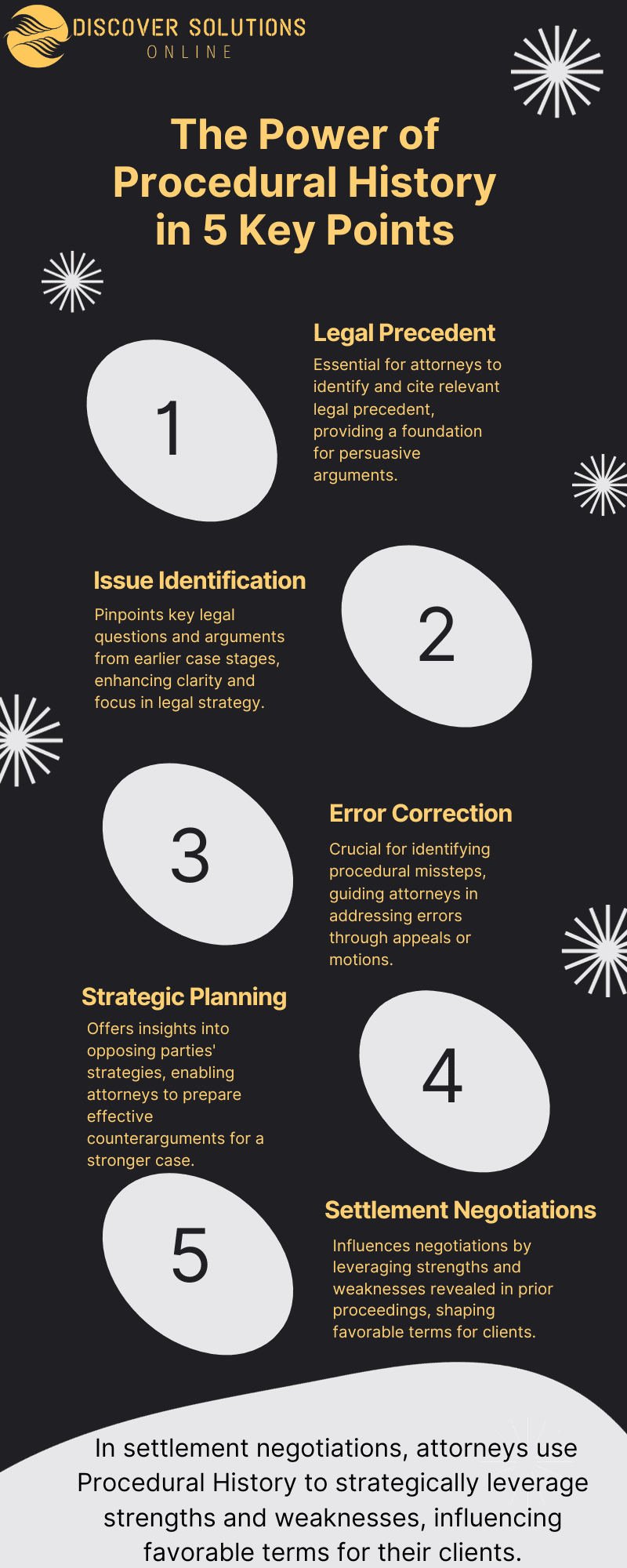When it comes to drafting a compelling legal brief or motion, a well-structured Procedural History is crucial. This section of your legal document serves as a concise roadmap that guides the reader through the key events and proceedings that have led to the current legal issue. In this article, we will discuss the essential elements and format of a Procedural History, along with how Discover Solutions Online can assist you in this vital aspect of legal writing.
The Key Elements of a Procedural History
Chronological Order
A Procedural History must be presented in chronological order, starting from the earliest event and progressing to the most recent. This ensures that the reader can easily follow the timeline of the case.
Identify Key Events
Include only the events and hearings that are directly relevant to the current legal matter. These could be court hearings, filings, orders, or other significant developments. Avoid unnecessary details or information that does not pertain to the issue at hand.
Dates and Details
Be precise about the dates when each event occurred. Alongside the dates, provide a brief but informative description of each event, so the reader can grasp the significance of what transpired.
Case Citation
If available, include case citations for any relevant prior decisions or appeals that played a role in shaping the case. This allows the reader to easily locate and refer to those decisions.

How Discover Solutions Online Can Help
Discover Solutions Online can play a crucial role in making the process smoother for legal professionals. Our services include:
Research Assistance
Our team of skilled legal researchers can help you gather the necessary documents and information to construct an accurate Procedural History.
Document Review and Organization
We can assist in reviewing case files, organizing relevant documents, and summarizing the key events, so you can focus on drafting the Procedural History.
Legal Writing Support
Our experts can help you craft a clear and concise Procedural History that complies with legal standards.
Proofreading and Editing
We ensure that your Procedural History is free of errors and inconsistencies, enhancing its overall quality and readability.
In summary, a well-structured Procedural History is an indispensable element of any legal brief or motion, providing the reader with a clear understanding of the case’s background. Discover Solutions Online is here to assist you with the research and drafting of your Procedural History, allowing you to focus on the core aspects of your legal work. Our dedicated team is ready to support you in producing high-quality legal documents.
What Information to Include in a Procedural History
When crafting a compelling legal brief or motion, a well-constructed Procedural History is essential. This section provides an overview of the key events and dates that have shaped the legal case, offering a chronological narrative that helps the court understand the context and significance of the issue at hand. In this blog, we’ll delve into what information to include in a Procedural History and how Discover Solutions Online can assist you in this crucial step of legal documentation. Here are a few Components of a Procedural History:
Case Background
Begin your Procedural History by introducing the case, including the names of the parties involved and the court in which the matter is being heard. Provide a concise description of the main legal issue.
Filing Date
Specify the date when the initial complaint or motion was filed. This date marks the starting point of the legal proceedings.
Key Dates
Highlight significant dates in the case’s timeline. These may include hearing dates, court orders, or important deadlines. Ensure that you include both scheduled and adjourned hearings to reflect the full history accurately.
Motion and Response Filings
Document the various motions and responses filed by both parties. Include the titles of the documents, filing dates, and their outcomes, whether they were granted or denied.
Substantive Developments
Mention any important events or developments that occurred during the case, such as settlements, witness testimonies, or any noteworthy evidentiary submissions.
Rulings and Orders
Clearly outline any rulings, orders, or judgments issued by the court throughout the case. Include the dates when these decisions were made and their impact on the proceedings.
Amendments and Pleadings
If there were any amendments or changes to the case’s pleadings, make sure to incorporate these into your Procedural History, along with their respective dates.
Adjournments and Continuances
Record any instances where the case was adjourned or continued and the reasons for such delays.
Discovery
Mention key details about the discovery process, such as document production, depositions, or interrogatories, and their respective dates.
Other Relevant Events
Include any other relevant information, such as changes in legal representation or any extraneous factors that may have influenced the case’s progression.
How Discover Solutions Online Can Assist
Discover Solutions Online specializes in helping legal professionals streamline workflows and increase productivity. We offer various forms of assistance:
Research and Document Review
Our experienced legal researchers can help you gather and organize the necessary information for your Procedural History.
Drafting Support
Our team of legal experts can aid you in crafting a precise and concise Procedural History that adheres to best practices.
Timely Delivery
At Discover Solutions Online, we understand the importance of meeting deadlines. Our services are designed to help you deliver your legal brief or motion on time.
By availing our legal outsourcing services, you can save valuable time and ensure that your Procedural History is a clear and persuasive account of the case’s timeline, strengthening your overall legal argument.
In conclusion, a well-structured Procedural History is a vital component of any legal brief or motion. It provides a chronological narrative of the case’s key events and dates, helping the court to understand the context and significance of the issue at hand. Discover Solutions Online can assist you in creating an effective Procedural History, ensuring that your legal documentation is of the highest quality and adheres to best practices in the field of law.
Common Mistakes to Avoid When Writing a Procedural History for a Legal Brief or Motion
In the realm of legal briefs and motions, a well-constructed Procedural History is paramount. It serves as the foundation upon which the rest of your legal argument will be built. A carefully crafted Procedural History helps judges and opposing counsel understand the context of your case, making it easier for them to grasp the key issues at hand. However, many legal professionals often fall into the trap of making avoidable mistakes in this critical section. In this section of our blog, we’ll explore common errors to watch out for when drafting a Procedural History, and we’ll highlight how Discover Solutions Online can assist you in avoiding these pitfalls.
Incomplete or Inaccurate Information
A common mistake when writing a Procedural History is failing to include all relevant events or inaccurately summarizing them. This can mislead the court and leave them with an incomplete understanding of the case. Discover Solutions Online can help by meticulously reviewing case documents and extracting accurate procedural details, ensuring that your Procedural History is both comprehensive and precise.
Lack of Chronological Order
A Procedural History should follow a chronological order of events. Failing to do so can confuse readers and detract from the clarity of your argument. Discover Solutions Online has extensive experience in organizing complex case information into a logical timeline, ensuring that your Procedural History flows seamlessly.
Overly Detailed Descriptions
On the flip side, some legal professionals delve into unnecessary detail, bogging down their Procedural History with non-essential information. Our team can help you strike the right balance between including pertinent facts and avoiding information overload, ensuring that your Procedural History remains concise and focused.
Failure to Highlight Key Events
Not every event in the Procedural History is of equal importance. Omitting key events or failing to highlight them can obscure the pivotal moments of your case. Discover Solutions Online can assist by identifying and emphasizing the critical events in your case, ensuring that they are given the attention they deserve.
Inadequate Clarity and Organization
Clarity is essential in a Procedural History section. If your readers have to struggle to follow the sequence of events, your argument may be lost. Discover Solutions Online specializes in organizing information in a clear and logical manner, helping your Procedural History shine.
Neglecting Relevance to the Current Motion
Another mistake is including information that is not directly relevant to the current motion or brief. This can dilute the impact of your argument. Our team at Discover Solutions Online can focus on extracting and presenting only the most pertinent information, ensuring that your Procedural History supports your current legal strategy effectively.
Ignoring Citation and Referencing
A Procedural History section should be well-cited, with references to case law and relevant documents. Failure to do so can weaken the credibility of your brief. Discover Solutions Online can ensure that your Procedural History includes proper citations and references in compliance with legal standards.
In conclusion, writing a Procedural History for a legal brief or motion is a critical task that can greatly influence the outcome of your case. Avoiding common mistakes in this section is essential for crafting a persuasive and compelling argument. Discover Solutions Online can assist you in creating a flawless procedural history by offering expert legal research and document review services. By leveraging our expertise, you can ensure that your Procedural History is accurate, well-organized, and perfectly tailored to support your legal strategy.





